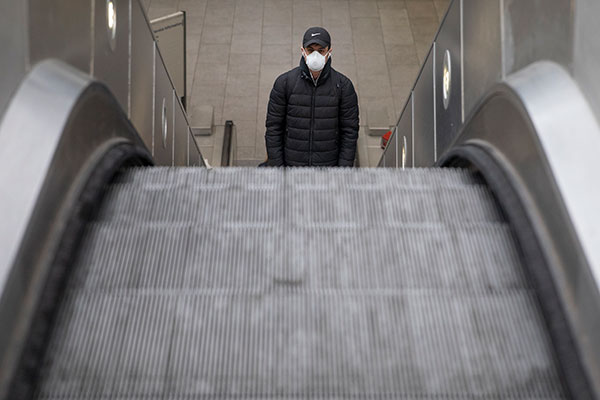Pandemics reveal structural weaknesses: at pace and scale. And that is precisely what Coronavirus has done over the past few weeks. Deep structural weaknesses have left more vulnerable people and places exposed for some time; now these weaknesses are visible to all.
In the case of the UK, fundamental weaknesses in governance, of authority and decisiveness, have appeared, through an early unwillingness or incapability to act at pace and scale. There are increasing signs that the Government is catching up with the severity of the moment; it took far too long. Many European societies have had, perhaps surprisingly, similar deficits as, of course, has the US. Coronavirus gets to the core of things and deep-seated weaknesses in our capacity to respond, to be resilient, have been obvious.
One area where we can but look on in awe is the individual determination to respond. Health care workers, civil servants, the scientific community, local government, community-facing charities, those in care, education, transport, food distribution and supply and many other essential services have responded with grit and alacrity. We are deeply in their debt.
Unfortunately, they are having to respond through systems – of governance, economy and finance, technology, public services and civil society – that have been shown to be too weak. We have not, across the developed world, been able to respond with enough pace and scale. In revealing the weakness of the present, this pandemic has already pointed to a need for a bridge to a new future. We can start to imagine that future even as we respond to the acute needs of now.
In the following we take a look at what is required in the UK now and in the future, with strong parallels to challenges faced in the rest of the world.
Coronavirus and systemic deficiencies in the UK
What is immediately required?
Our economic structure is too insecure. We have complacently taken record employment levels and burgeoning self-employment to be a sign of underlying health when the precarious nature of much of that employment was under-appreciated. Now we know the social contract has failed to keep pace with modern employment.
The Government announced £330bn of new loans for business and direct support for business and that was a necessary start. And the announcement by Rishi Sunak, Chancellor of the Exchequer, to support 80 percent of wages and increase support through Universal Credit is very welcome indeed. It was bold and at scale, exactly the type of decisive action needed. There is still more required, not least to support those in atypical and self-employment.
As the RSA’s latest economic security survey (PDF, 1MB), published today, shows, underlying insecurity was already significant.
- Only a third feel able to put aside a comfortable level of savings each month.
- Going into the acute stage of the crisis, 37 percent of workers felt they would need to work even if they contracted the illness to ensure they had income, which rises to half of gig and self-employed workers.
- And 16 percent of workers fear homelessness, rising to a third of insecure workers.
Do we have the financial structures, with proximity to business and community, to properly disperse and shepherd resources with the urgency required?
Too many communities lack close support from financial institutions. We lack the infrastructure for a solidarity economy. Moreover, essential supply chains such as in ‘just-in-time’ food retail are heavily exposed spreading even more anxiety.
A failure to underwrite public and community infrastructure is harming us profoundly in this moment. Health and care services are under-staffed with 100,000 vacancies in the former and 120,000 in the latter according to the Health Foundation. Built-in system latency has been eroded. Local authorities have seen their funding cut by 49 percent in a decade with big knock-on effects for the voluntary and community sector.
What this means in practice is that essential preventative and support services have been dismantled. Large trusts and foundations can’t fill the enormous gap. Those who are currently working 100 hours plus in an NHS already stretched know what this means at an acute moment. Some hotel groups are offering their beds as back-up acute care capacity.

Again, there is extraordinary individual initiative and commitment at such a time (though there are some more negative traits such as stockpiling – completely understandable though that may be - and a failure to observe essential social distancing). But weak systems of governance have left individual initiative and solidarity in deficit over time.
And the people that will be hit hardest will be those who are most vulnerable. Of course, with a deep sense of tragedy, this means those who are vulnerable to the disease. The human loss is incalculable. Beyond the health consequences, there are other impacts that shouldn’t be ignored. On Friday, schools closed. The biggest loss will be for those who are already falling behind or who are vulnerable in an enormously unequal education system.
Let’s be clear, many children rely on school for free hot meals, sanctuary, and some chance to develop and learn. That is now lost for many who will not have access to the right technology, the right learning environment, or the right support.
Those most in need of professional support from teachers and support staff will suffer most and the hit could be permanent as we know from research on “summer learning loss” as a result of the long school holidays (notwithstanding schools remaining open for those with an education health and care plan for special educational needs). Thank goodness that the BBC has stepped up to massively expand its educational content: television remains the most accessible medium for all.
Coronavirus is shining a blinding light on our systemic deficiencies. These deficiencies, of authority and institutions underpinning evident shared values and solidarity, signal further coming crises. We are not yet capable as societies to make the changes necessary to combat the climate emergency. That requires more than technology; it requires a deep democratic conversation and enormous supports for people and communities who must adapt and develop deeper resilience.
This change will require whole society mobilisation over time. Similar levels of concerted action are needed: from employers, Government, unions and others who support workers and individuals to develop a more robust social contract where security and initiative can be brought together. The same is true of ensuring that democracy is healthy – how little attention we have been paying to the blurred messages that have been coming from Governments – and society is less deeply unequal in its access to good education, work, and wellbeing.
And, of course, the international dimension is critical here. As less well-resourced societies first face Covid-19 and then societal challenges of the same magnitude, they will require just as much support as we are getting as knowledge about the virus, pandemic response, and access to possible new tests, vaccines, and antiretroviral treatment expands.
Little about the past few weeks suggests we are ready to confront these overarching challenges. But if we respond at even greater pace and scale to the current emergency, we may find opportunities to begin building bridges to a new future. This new future has to be invested with strong values: of democracy, freedom, rule of law, and togetherness.
Emergency architecture such as lock downs, military presence, and even digital surveillance have to be seen as strictly temporary and as absolutely necessary alone. In a post-pandemic world, such measures could be highly dangerous. Such concerns are precisely why values are so important in the ‘bridge’ world.
5 pathways to a more resilient future
In the spirit of responding now whilst having one eye on the horizon, the RSA team has been considering what sort of responses could be useful. What can we seed today that can help to define a better horizon?
These ideas bring together forces of authority, collective spirit and individual initiative. They are intended to open a deliberative space rather than any more closed definitive intent. Over the coming days and weeks we will be developing the dialogue further.
We would love to hear thoughts, ideas, concerns, observations and reflections from Fellows and many others: post here or get in touch. The following captures some of our emerging thinking.

1. Get cash to people now and build the social contract of the future
We welcome the Government’s employment and wage support scheme announced yesterday. It doesn’t yet go far enough. Lay-offs and reductions in hours are already great. People need cash in their pocket now (at the very least to stave off debts and lay a foundation for economic recovery), most particularly those in freelance, self-employed, gig zero hours and agency work. This would involve:
- Cash grants through self-assessment tax systems of £1,500 per individual then £100 per week for the next three months for those with income through work (eg does not include those who self-assess for property or investment income). This payment could be made through PAYE for agency workers via their agency. This essentially turns income tax and national insurance allowances into a cash payment with a top up distributed to the millions of workers not able to benefit from yesterday’s wage support measures. Child benefit should be increased to £50 per week per child for all for three months initially. This would be the foundation of a future system of Basic Income to be accessed periodically throughout the life-cycle. We estimate a cost of £9bn for this policy. Past modelling has shown this approach reduces poverty and inequality.
- Where individuals were not working they would receive a grant of £1,500 through Universal Credit, Job Seekers Allowance or Employment and Support Allowance and then £100 per week in addition to credits and benefits for three months. This is in addition to the changes announced by the Chancellor. All conditionality should be removed.
- As there are still some outside the system, funds would be given to local authorities and large charities to support those vulnerable beyond tax and benefits systems. Local authorities may also work with central government to requisition bank details via ‘third party notices’ to provide payments directly into the accounts of those beyond those systems.
- Double statutory sick pay and work with the insurance industry, unions, professional associations, and worker support initiatives (such as supported in the Future Work Awards) to create a portable benefits platform for gig workers.

2. A fiscal stimulus for community: urgent support to local authorities and major grant-making bodies to support civil society infrastructure
- A major £10bn ‘fiscal stimulus for community’ to go directly to local charities in proportion to their size providing essential community support, care and resilience to enable them to survive the present and shift their operations into more remote forms. This would be designed to underwrite up to three months of reserves with some co-funding from major grant-making bodies. We note that the wage support measures announced yesterday also benefit charities and other social good organisations such as social enterprises and community businesses which we welcome.
- This collaboration between civil society organisations, councils, funders and community finance organisations would form the basis of a new means of ensuring that charities and community groups have even stronger access to core finance in the form of grants and loans in the future.
- By channelling the resource through local authorities with co-funding support from major grant-making bodies and community development finance institutions, an alignment with wider public services and other public and place-based goals can be ensured creating a stronger foundation for civil society and greater coordination.
- The system should be weighted to ensure that support targets places and areas in need.
- Going forward, banking needs in a particular area should be reassessed and community banking infrastructure strengthened: A layer of local, community-based banks (similar to Sparkassen in Germany) would provide an additional, receptive channel for emergency funds and guaranteed loans to reach businesses and individuals far more efficiently than the current system allows.
Further reading

3. Establish a new ‘school plus’ education service
- Allow schools to identify additional ‘vulnerable’ children who may suffer disproportionately from not being in school, and allow them to stay in school, subject to limits on pupil numbers imposed by the Government’s Covid-19 response. Alternatively, prioritise remote support from qualified teachers and tutors for these pupils.
- Expand online tutoring services, free at the point of access, with priority for the most vulnerable. Build on existing, evidence-based models. Tutors could include volunteers such as university students who could be encouraged to participate by earning credits towards their degree. Others may need to be compensated for their time in this period of insecurity.
- Promote and develop the BBC’s plans for daily educational TV and radio programmes, as the most accessible form of remote learning. Prioritise development of accessible versions of online resources for parents and carers with low literacy levels. Identify a set of free high-quality online resources for each Key Stage to promote to all parents.
- Provide funding to enable vulnerable families to access critical equipment such as laptops and broadband subscriptions. This will ensure they can access online educational materials.
- Require independent schools with charitable status to make online education events and materials available to all, wherever practically possible.
- Create a remote support service using youth workers, teachers, classroom assistants to provide advice and support for families to create a home environment conducive to learning, with priority for the most vulnerable.

4. Support agility and resilience in health, care and neighbourhood services
- Our public services have already shown enormous reserves of agility and resilience. They should be supported further.
- Additional funding and deliberate ring-fencing of preventative services such as home support and care, public health, early stage mental health, youth services, children’s centres and police community support services. These services should receive support now with investment in remote communications including staffing to enable them to serve vulnerable groups and communities during self-isolation.
- Begin to invest in ‘agile’ self-management approaches for community and care workers, learning from adaptation in the crisis period to regularise supported self-management.
- Encourage and support local services to tap into the flood of community volunteering in the past few days through a single, curated information hub. Share innovations, resources, technological tools and approaches to tapping into the new volunteer force. Where civil society responses such as Covid-19 Mutual Aid are emerging they should receive emergency financial support.
Further reading

5. 'Beyond GDP’ stimulus
- Reducing economic activity in order to safeguard individuals and businesses to protect public health is the current critical objective. At some point we will move to the economic stimulus phase and this should be infused with broader objectives than growth alone.
- Many businesses will require Government support. Priority should be given to businesses which have a clear role to play in a low-carbon economy and are clearly already committed to this transition. Support packages should therefore come with requirements to show clear alignment with zero-carbon targets.
- Government should look to support people back into employment by providing training and investing in areas where we are currently behind on meeting zero-carbon targets, such as energy efficiency.
- This not only covers technology but should include investment in public services, civil society, small businesses and regional infrastructure which can support local areas to build resilience in the coming years as discussed above.
- In order to set the right direction and to assess the success of these interventions we will need new measures, including those which track economic, environmental and civic resilience.
These ideas link our immediate and urgent needs to pathways for a more resilient and adaptive future. What unifies these proposals is that they are not simply policy driven. They ask something of all us, to volunteer, to imagine, to deliberate, to commit. Where we head next as societies can’t just been driven by the political communications and ideologies of closed elites: from whatever point of the political spectrum. A wider, participatory public dialogue is crucial. What type of future do we want and what do we feel able to commit to?
In coming weeks, the RSA will be seeking to help make sense of the current situation whilst encouraging a dialogue about where we might head next. The RSA exists to work with many others to help bring ideas and people together to collectively lean into the challenges of these times. Nobody wanted to be in this situation. It will get much tougher. We owe it to ourselves and future generations to respond at scale and pace now; and build bridges to a more resilient, collective future.
This article was written with input from across the RSA Research and Impact team.
Share your ideas on how to respond to the Coronavirus crisis
If you’ve had an idea to tackle any of the numerous challenges caused by Coronavirus and are in need of help from RSA Fellows to get a project going, post an idea and ask for support.
Alternatively, if you want to offer your expertise and time to help an idea grow, browse through the suggestions and offer help where possible. This platform is a hub for solutions and support:

Join the discussion
Comments
Please login to post a comment or reply
Don't have an account? Click here to register.
This is a fascinating and provocative read. I have been following all the recent RSA initiatives for Building Bridges and admire the cogency and consistency of the arguments being put forward but one thing is missing from all of this discussion. In a post Covid environment the greatest deterioration of our workforce capacity and in the integrity of our communities will be in the mental health of the nation. That is the 'R' number no one is talking about. Resilience to mental illness! I am part of the steering group for the RSA Mindful Living Network and we have just about to relaunch the Network with a series of on line events. Which is well and good but there does not seem to be anywhere in the RSA structure for Fellows to initiate a conversation about making mindfulness available across the national population particularly for those most affected and who would most benefit from a practice that is inexpensive to train and that costs nothing to practice but has endless benefits including enhanced emotional resilience and an increased ability to focus and opens to compassion for oneself and others. Where can I go with my ideas? How do we build a case of a country wide intervention? Who can we work with? I would dearly like to know.
Thanks Anthony! It's indicative of the scale of the challenge that even this really excellent article feels like it doesn't cover the whole of what is needed to build bridges to the future. For me there are two gaps:
1. We will wake up from the COVID Crisis to find the Climate Change crisis hasn't gone away, even if there have been some temporary reductions in carbon emissions during lockdown. Scarily this is bigger and less tractable than COVID - no equivalent of a vaccine! And our reserves - financial, emotional, tolerance for directive communication and necessary life changes - will have been depleted, for some exhausted altogether. So we need a segway from COVID to Climate Change which is more than just wishful thinking (of which there seems to be a lot at the moment) that we will somehow move smoothly in our new-found solution mode from the one to the other.
2. This leads on to my second point, but actually this applies to health as well as Climate Change. We should be able, by the end of the COVID crisis, to see in the clearest terms that prevention is better than cure. Stripping away the various versions of the political blame game, it should be clear that had the infection not jumped from animals, or been swiftly stopped at source, and/or had we been better prepared, then the cost, inconvenience, and death toll, would surely have been reduced. Critically, this would have needed action before the need was urgent or obvious to most people. This is where we fall over, with climate change, health, and many other things - action on obvious / urgent crises usually is forthcoming, but important things that can be put off to tomorrow never get the same priority. Worse, with climate change, the urgent action for someone facing floods or bushfires is not to reduce their fossil fuel consumption - there is a disconnection of experience and action. So the preventative approach is an even greater effort of leadership and will.
So... can we build from the health experience where the preventative steps may seem more obvious, and graduate from there to preventative actions on climate change? Specifically move in two steps:
1) move immediately from ending this pandemic to decisive international action to prevent/prepare properly for the next pandemic, while we can all vividly remember how much trouble this will save, then
2) take the same approach to develop a much stronger prevention plan for climate change. (OK climate change is well advanced so prevention doesn't quite feel like the right word, but reducing carbon emissions still is prevention of what might lie ahead). We've known for years (from the Stern report) that it is cheaper to mitigate climate change than adapt to it - now we need to act on that.
Dagmar is quite correct. Our tax system is in need of an overhaul. Put an end to the loopholes by simplifying the system i.e. remove all allowances. Separate out the Tax and Customs and let the Revenue collect tax and VAT and Customs concentrate on the borders.
Staff up the Revenue so they can act more locally and catch those evading tax through illegal means. Reopen local offices.
Bring in rules to prevent the hiding of money in shady (usually palm-shaded) offshore companies.
Brilliant piece!
Is there a qualitative report or supplement to the survey? Rather difficult to extrapolate key insights from a 176 page quantitative survey!
Health care is adapting rapidly in response to this crisis. Frontline clinical staff are driving changing at a local level. Local charities are approaching and working with frontline staff to support the war effort and new local community based collaborations are emerging. New connections are developing and traditional boundaries are being breached. New challenges and hard times force us to think and work differently and we need to capture some of this stuff and build on it.